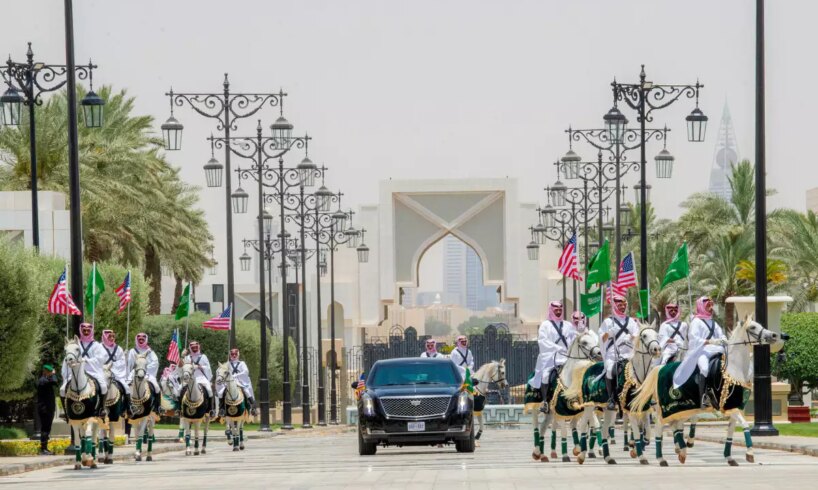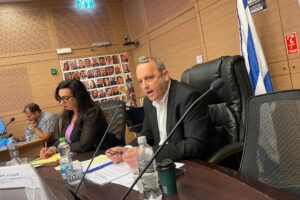
“Imagine,” American Rabbi Marc Schneier remarked, “that the spiritual center of Islam were to normalize with the spiritual center of Judaism – how that would resonate throughout the Islamic world.”
This describes the individual sometimes dubbed “rabbi to kings.” Schneier’s persona has been linked for years with Arab and Muslim state leaders worldwide, from Saudi Arabia’s monarch to Azerbaijan’s president, from Qatar’s emir to the United Arab Emirates’ ruler. In an exclusive Israel Hayom interview, Schneier discusses diplomacy and pragmatism through the lens of faith and stated that for him the real prize is not political, but spiritual.
“I’m the 18th generation rabbi in my family,” he begins. “I’ve always wanted to be a rabbi – and to appreciate what it means to be a rabbi.”
Schneier received ordination in 1983 by Rabbi Joseph Soloveitchik, yet his calling extends beyond the synagogue and community he founded in the Hamptons, New York. “In my office… one wall has photos with kings and presidents, but the other side overlooks the synagogue. That’s what gives me a sense of purpose and fulfillment.”
The signing of the Abraham Accords in 2020 between Bahrain, Israel, the US, and the United Arab Emirates (UAE) / Reuters
“In my family, you have to make two contributions – both congregationally, spiritually, and also from the social-action point of view,” he continues, and consequently, in 1989 he founded the Foundation for Ethnic Understanding, to restore the historic alliance between African Americans and Jews forged during the civil rights movement in the United States. “Martin Luther King comprehended that whoever struggles for his own rights can only do so if he also battles for others’ rights. King was a great champion of Israel… He had zero tolerance for antisemitism.”
After two decades leading it, he decided to pursue a new direction, “I thought that the great challenge of my generation would be to find the path to narrow the divide between 16 million Jews and 1.8 billion Muslims. And that’s what sent me off on my global journey.”
Schneier recounts how Muslim world doors opened before him. “My great patron was the late King of Saudi Arabia, King Abdullah… he introduced me to the King of Bahrain, who introduced me to the Emir of Qatar, who introduced me to the ruler of the UAE, who introduced me to [Azerbaijani leader] Aliyev — and then Kazakhstan… Even i24NEWS today said, ‘this is the one who planted all the seeds for the Abraham Accords.'”
“I say everywhere – in Riyadh, Doha, Baku, Ankara – anti-Zionism is antisemitism. Israel is not some political 77-year-old aspiration; it’s at the very core of our religion.” He adds, “How can you be a Jew and not be a Zionist? Why would you bifurcate? … I am, in this work, a watchdog when it comes to Israel.” The leaders, according to him, value his consistency. “One of these leaders said to me, ‘Presidents and heads of state, ambassadors — they come and go, and you’re always there. We all need a rabbi.'”
Emir of Qatar Sheikh Tamim bin Hamad Al Thani attends a meeting with Russia’s Foreign Minister Sergei Lavrov in Doha, Qatar February 26, 2025 (Reuters / Russian Foreign Ministry)
Beyond his community position in the Hamptons, he was appointed special advisor by the King of Bahrain to the King Hamad Global Centre for Peaceful Coexistence based in Manama, and in 2022 served as interfaith consultant to the World Cup organization in Qatar, whose reputation in Israel naturally transformed completely following the war.
Rabbi Schneier with the king of Bahrain (FFEU)
“The Qataris always come through for me… I served as interfaith advisor to the World Cup. I had three conditions: 15,000 Israelis, direct flights between Doha and Tel Aviv, and kosher food,” he states, “I brought two rabbis from Turkey… check, check, check [referring to all three conditions being met].” Qatar itself naturally leveraged the treatment of Israelis to bolster its image, while preserving relations with Israel’s adversaries in the Middle East.
Rabbi Schneier with President Herzog and President Aliyev (Courtesy)
He portrays his warm relationship with Aliyev, Azerbaijan’s president, whom he calls “like family for me. There’s nothing Aliyev wouldn’t do for Israel.” He recalled telling one Arab leader that if he wanted to normalize relations with Israel, he should simply follow what Azerbaijan does.
With Turkey, Schneier was involved in the thawing of relations between President Recep Tayyip Erdoğan and President Isaac Herzog in 2021. “The Turkish ambassador to Washington called Erdoğan from my office… I said it would be a wonderful opportunity for President Erdogan to call President Herzog – which he did. And by March 2022 we had the famous reconciliation meeting in Ankara.” Schneier adds that “Erdogan was a big disappointment to me because of his absolute hatred for Netanyahu… Erdogan loves Herzog. Loves him.”
Turkish President Tayyip Erdogan and President Isaac Herzog shake hands during a joint news conference in Ankara, Turkey March 9, 2022 (Reuters/Presidential Press Office/Handout)
He characterizes Hamas as “a perversion of Islam,” saying that the war in Gaza “is a war against evil, not a war of religion.” According to him, there are 12 Muslim countries that support or express sympathy for Israel. Muslim leaders support Israel’s right to defend itself.
Schneier believes the agreement to release the hostages and ceasefire signals a regional transformation. “If Hamas doesn’t behave… not only will they have to deal with the Israelis, they’ll have to deal with the Americans — and good luck to them.” He notes that is an unprecedented opportunity. If Gaza is demilitarized and administered by an Arab consortium and provided economic hope, everything can be transformed.
Schneier’s book was translated in Indonesia with the support of the regime, and has a forward by former President Clinton (Courtesy)
Regarding the Abraham Accords, Schneier enumerated Saudi Arabia, Qatar, Indonesia, Pakistan, Oman, Syria and Lebanon, as countries that may normalize relations with Israel in the near future. However, he indicated that “There’s going to be very little movement in the Arab world until… Israelis recognize that everyone wants to see a Palestinian state – even if only symbolic.”
Schneier participated in the “Peace to Prosperity” conference in Bahrain in 2019, and is convinced that Jared Kushner was correct, that money and hope can alter perception. He recalls Saudi Crown Prince Mohammed bin Salman’s words, “MBS said to me, ‘Rabbi, you probably think I want to normalize relations with Israel because of Iran. That’s the second reason. The first is Vision 2030 – the economic transformation of the kingdom that I cannot accomplish without Israel.'”
Democratic candidate Zohran Mamdani speaks during a mayoral debate, Thursday, Oct. 16, 2025, in New York (AP / Angelina Katsanis)
Schneier divides the region into two blocs, “You have the Saudi bloc – Saudi Arabia, Bahrain, UAE, even Qatar – and you have the Iranian bloc… Why doesn’t anyone recognize that blessing?”
He expresses concern about the situation in New York and the weakening of Jewish influence in the city, and warns against Zohran Mamdani’s rise, He [Mamdani] will finesse every issue – police, education, even prostitution – except one: Israel. He won’t even recognize Israel as a democratic Jewish state.”
At the conversation’s conclusion, he sends a warm message to Israelis, “For American Jews, Israelis are a great source of inspiration. We enjoy the security and the strength we have in the Diaspora only because of the State of Israel… It has restored the honor and the dignity of the Jewish people… There’s never been a better time to be Jewish than today.”





